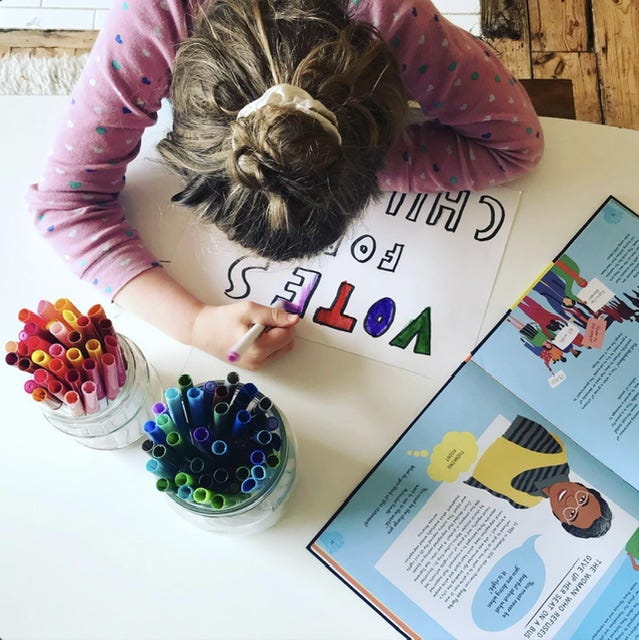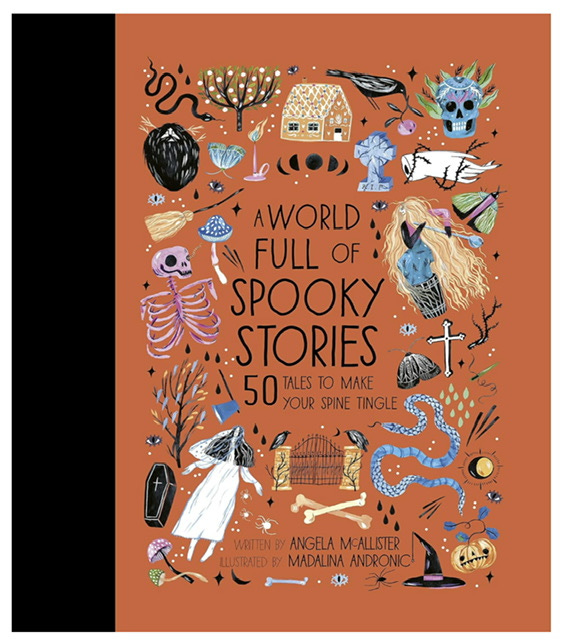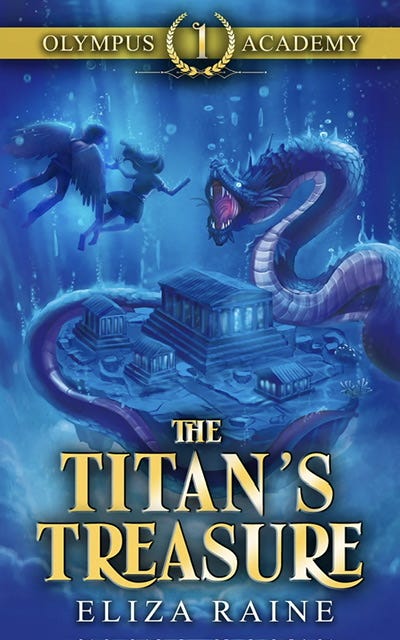Special Guest Edition: How We Homeschooled Today by Eloise Rickman
Consent-based learning in action
Many of you will already be familiar with Eloise Rickman. I first found her on Instagram several years ago, and shortly after that I did her excellent Beautiful Education course. She’s the author of Extraordinary Parenting: The essential guide to parenting and educating at home, and her next book is due out in June 2024: It’s Not Fair: why it’s time for a grown-up conversation about how adults treat children.
Eloise is a passionate advocate of children’s rights and it’s great to see how that plays out in her day-to-day life with her daughter. I loved reading her guest post and I hope you do too. In the unlikely event that you’re not already reading her Substack, Small Places, I recommend you do so as soon as you’ve finished this.
(The following is all shared with my daughter’s permission.)
I think people are often surprised that we don’t unschool, given that my work focuses on children’s rights and the idea of children’s liberation. Whilst I absolutely love, support, and respect the unschooling movement, I think lots of different kinds of education can be rights-affirming, joyful, and support children to thrive, and right now it doesn’t feel like quite the right fit for our daughter. If I had to describe how we homeschool, I’d say it’s an eclectic, relationship-based, semi-structured approach: some adult-led learning paired with lots of time for self-directed activities, play, rest, projects, classes and groups, and time with friends.
Our daughter, F, has never been to school. Now she is eight, our weeks follow a pretty strong rhythm in order to fit in the activities she enjoys doing: bouldering class, ice skating with friends, swimming lesson, piano lesson, a big home ed meet up, and a weekly playdate with her best friend, as well as a monthly book club with some of her friends. We have one weekday a week with no set plans which gives us flexibility to go on bigger outings, see family or friends, go for a nature walk, or simply have a quiet day at home with extra time for play, watching films, reading, and pottering about. Two days a week my husband is the main home ed parent on duty and I work (he is lucky enough to be able to work flexibly to accommodate this), though I will often spend a couple of hours in the morning with F before I head upstairs to my desk.

Whilst our days all look different, a typical day in the life might start with me getting up around seven, sometimes later. I’m not really a morning person but I find I actually wake up earlier in the autumn and winter, probably because the darker evenings mean I go to sleep earlier the night before! I go downstairs, take my daily probiotic and vitamins, empty the dishwasher, hang out any laundry, and put the kettle on for my first cup of tea of the day (currently obsessed with this). Then I get ready for the day and see if F is awake and ready to get up. Some days she’s up before me, some days she prefers to lie cozy in bed listening to an audiobook or reading—if the book is really good I might get asked to deliver toast and tea to her in bed.
I find that our days work most smoothly if we do our structured / adult-led learning in the morning before heading out to other activities. Every morning, I generally aim to do at least some of the following with F:
A page or so of maths, more if she’s especially feeling it. We use Beast Academy which she likes predominantly because there are comic-style textbooks to go alongside the workbooks.
Root word study. We are using English From The Roots Up Vol. Two, after completing volume one last year. We usually learn one new word a day and quickly revise one or two older ones, though sometimes we will just revise older words, spending more time remembering derivative words. I’m going to make a bold statement here and say that of all the ‘formal’ learning we’ve done over the years, learning root words and some Latin has quite possibly had the biggest impact. I love that she can figure out the meaning of so many unfamiliar words; recently we came across ‘circumnavigation’ and she could immediately break it into circum (around) and navigo (I sail) and figure out what it meant. Learning about roots also leads us into discussing the meaning of derivative words which we might not otherwise have covered. For example, we recently covered the words egregious, gregarious, congregate, aggregate, and segregate—all of which share the same root words (gregis / grex which broadly mean group, herd, flock, etc).
Latin. Doing some gentle Latin over the last few years alongside root word study has worked really well, and it’s magic being able to see F read and translate some very short books in Latin to my mystified husband. This is the first year she is writing her answers rather than just discussing them with me, so we’re currently just revising Minimus, which we’ve already read. My hope is that once we’ve finished written revision, she will have the writing stamina to dive into the more challenging Minimus Secundus. Writing and comprehension are two very different skills, and doing it this way makes sense to me, though I imagine it sounds quite chaotic! We are also dipping into Telling Tales in Latin which is great, and spending some time discussing Ovid’s Metamorphoses. We will often read or talk about Roman history too.
Read a chapter of our read-aloud. We’ve just started The Storm Runner which is the first book in a Rick Riordan Presents… series which features Mayan mythology. I suggested it as her history pick for the year was Mayans, Aztecs and Incas. Last year reading aloud was something which ended up not happening much—my daughter can read well, and much faster than I can read aloud, and so wasn’t really into the idea of me continuing to read big books to her—but I’m trying to build the habit again because once we get into a book together she really enjoys it (we recently read The Secret Garden together and it was wonderful). When I read aloud we can pause to chat about any unfamiliar words or ideas, look things up, and discuss what we’re reading. I think it makes for a lovely and rich experience, and I hope she keeps letting me read to her! I think we can still build a shared family culture around books even when she reads them to herself, though; when she read all of Rick Riordan’s Greek series I read them on my Kindle alongside her so we could still chat about them. Although we each read them silently in our own rooms, it’s a reading experience I will treasure for years to come.
Read a few pages of any other books we’re reading together. We’re currently reading Season of the Witch and A World Full of Spooky Stories as well as Vincent’s Starry Sky which is a beautiful art history book for children, and some history books related to our theme for the year such as this one and this one.
Spelling practice. This has been an interesting one for us to navigate. F is getting to the point where not being able to spell is getting frustrating at times, but she (understandably!) finds doing spelling practice horrendously dull. Whilst she can see the benefit long term, on a day-to-day basis she has little desire to do it. This is tricky for me: I seek her active consent for any formal learning she does (the word consent coming from the roots con or cum, together, and sentire, to feel; I love the idea of feeling something together and finding agreement) and I also see one of my roles as a home educating parent as helping F meet her medium-term goals. Sometimes these things feel in conflict with one another! One solution we have come up with for now is turning to external motivation to do a daily practice, which looks like a small prize on Fridays if she has done it every day. This feels far from ideal, yet I also promise myself little treats to get through unpleasant but necessary tasks so I also really do get it. We’ll see how it goes—I’m actively looking into how to make spelling more fun for her. I’m sure I’ll share more on my Instagram once I’ve cracked it (or we’ve decided to just ditch it…)
Handwriting practice. This is a very new thing, driven by F suddenly wanting to learn joined-up handwriting. I had nothing to do with this—in fact would rather she wrote in print for now because I am lazy and have no views whatsoever on handwriting—but she will not be deterred. She does this by copying the names of different Pokémon I have written for her in a handwriting book. I’m learning a lot about how different Pokémon evolve at the same time!
Piano practice, in preparation for her weekly lesson.
We’ve also just started (really just started, as in two days ago!) with some very gentle Shakespeare memorisation, following the book How To Teach Your Child Shakespeare. I have no idea if F will be into it long term, but for now she seems to be digging reciting the two lines we’ve memorised together so far.
Some of these things—especially the ones where I’m reading aloud—will happen whilst F eats her breakfast, which works well. Pretty much all of the above is ‘open and go’, meaning it takes little to no planning from me. As a neurodivergent grad student / writer / self-employed person who also likes to have a life where I read books, see friends, and have down time, this is really valuable for me! If we get to everything on ‘the list’ it can take us anything from 90 minutes to upwards of three hours, depending on how much of each thing she has an appetite for. We usually spend under two hours, much of which is taken up with me reading aloud and us chatting and going down random rabbit trails with the iPad in hand. Sometimes we will pick one or two things and that’s it, or do stuff in the evening instead. Bigger history, science, craft, and other projects which take more organisation from me—mostly in the form of sourcing materials or carving out a few uninterrupted hours—do get done, but we don’t have a set time in the week for them. My husband will also often do projects with F or read with her, but we mostly do our own thing (though I have started to ask him to oversee maths and spelling on his days too so I have to spend less time on these things on mine!).
It’s really important to me the she has a choice and can say no to things: if one day she is just not in the mood for something, I don’t push it. I love Charlotte Mason’s idea of laying an educational feast for our children: if you invited a guest to a feast it would do little for their appetite or enjoyment of the meal if they were forced to eat everything, even if they disliked a dish or were full! If she repeatedly shows no interest in something, I will discuss with her if she wants us to stop it for good, or if I need to look for better / more engaging resources. This is what happened with learning French. I’m half French, so teaching her French felt very important to me but she just didn’t enjoy it or want to do it, so after a few conversations (and a serious talk I had to have with myself) we’ve agreed to stop. Because she learns Latin I’m confident that she could pick French up quickly if she decides to explore that side of her heritage one day. At the end of each school year we have a big chat about what she’s enjoyed, what she hasn’t, what she wants more or less of, and so on. We have shorter chats like this regularly too.
We’ve usually finished our morning stack by 10:30. At that point we will either head to an activity or if we’re at home F will usually have an idea of what she wants to be doing. Sometimes that involves me, like playing a game, but often she wants to get on with something self-directed like drawing, an art project, reading, or playing. This gives me time to catch up on chores and making lunch, and I usually have time to take my book to the sofa with a cup of tea. If we’re at home for lunch we will often watch something whilst we eat, like a Magic School Bus episode or a documentary, and sometimes I read aloud. If we have a big stretch of time after lunch we might do a more ambitious art or craft project, or go for a walk in a local park. I find our days go really quickly, regardless of what we’re up to; home educating certainly never feels boring, and I really cherish our time together.
Once we get to around 5pm, F will usually choose to spend an hour watching a show on Netflix or playing an indy computer game like Rainbow Billy or Tinykin. During that time I make dinner, listen to the radio or a news podcast—or just music if that feels too heavy for my mood—and tidy up a bit; if dinner is a quick and easy affair I might read or catch up on emails for a bit too. If my husband is around then we might have a chat over dinner about current affairs or something ethical or philosophical. Tonight we talked about what’s happening in Israel and Gaza which was a tough conversation, but we wanted to provide a bit more information and give F the chance to ask us any questions she had after reading about it in The Week Junior. We also had a chat about how it’s normal to sometimes feel really upset or worried by the news.
The rest of our evening tends to be pretty chill, with a daily routine of audiobook in the bath (she’s currently on book three of Olympus Academy) / bedtime snack / tooth brushing followed by plenty of time to read, continue her audiobook, draw, or do whatever she fancies really. We’re currently watching the Great British Bake Off as a family, so one evening a week she’ll pile into our bed with snacks and we will judge the contestants’ cooking whilst eating shop-bought biscuits. We usually ask her to turn her light off around 9 if she’s not already done it (in the summer it’s 10), but we’re very open to discussion so it’s not a firm rule—I know the feeling of wanting to read one or five more chapters!
I know it’s a cliche, but our mornings are so much easier if we’ve cleaned our (tiny) kitchen the night before, tidied the dining room which doubles up as our home ed / art and craft / kinetic sand / lego space, put the dishwasher on and set the laundry on timer for the next morning. I also go through any plans for the next day, including gathering or prepping any snacks or lunches I’ll need to pack for outings. By bedtime I’m pretty much done. I usually chat to my husband for a bit then read in bed. What time I go to sleep usually correlates with how good my book is, and how much caffeine I’ve inhaled during the day.
Huge thanks to Eloise for giving us a glimpse into her day. If you’re new here, you might like to take a look at some previous guest posts:
Ruth Gaskovski on building community.
Katherine Seat getting out of the house on a noisy day in Cambodia.
Renee’s account of a homeschool day with her son, who has autism.
Mary-Ann Horley’s account of home education at home and on holiday.
Allyse Hopkins’ very relatable day with her family of four in New Zealand.
Susie Wales’ life with her three boys in Florida.
Rachael Ringenberg’s thoughtful glimpse into her life with four girls in Vermont.
Joel Bowman’s ‘away schooling’, travelling around the classical world with an eight year old.
If you’d like to be next, please do get in touch! All styles of home ed welcome.
Thanks for reading. If you’re not a subscriber, sign up for free and never miss a post.









What a treat to read this. A brief glimpse into a truly delightful education and childhood! Thank you Eloise.
As someone who longs to have learned a second language as a child, I can only imagine how hard it is for you not to share that with her right now! It makes me think of Raina Telgemeier's graphic novel "Ghosts," in which the mother notes she didn't learn any of her mother's native cooking methods--tortillas, empanadas--in time to remember them.
I mention this because you said ipads are kicking around anyway, my 7yr old loves a perfectly spelled list/story/paragraph. She will take the ipad and have Siri spell every word out for her. F. might enjoy this approach occasionally now and then for her projects.
I so agree the time passes quickly regardless of how it is spent!
This was actually so helpful. I get so much out of routines and just repeating into the pleasure of a common pursuit. I actually find that our reading turns into incredible and deep conversation. We rarely only read a book straight through as it is. Reading those longer books together also brings up so many discussion touchpoints in even unexpected places. My son used to be so intent on mythology, and we also read many Bible stories. They allowed for endless invocation at all kinds of moments in life, and they served well to turn any mundane development into something of profound and archetypal magnitude, or at least a great inside joke.